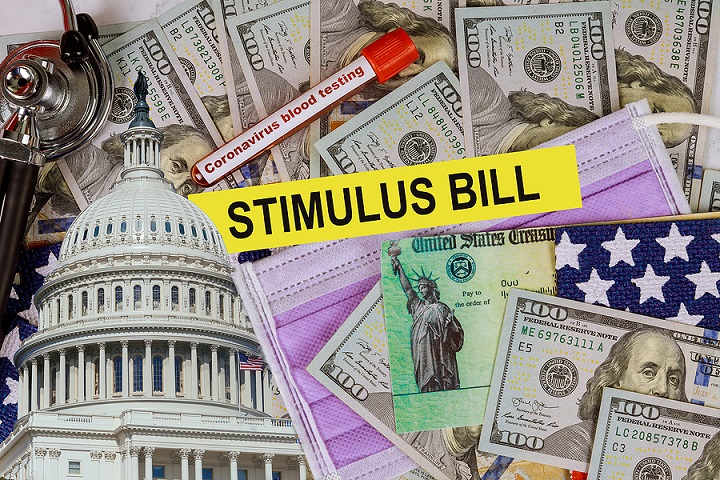COVID-Related Tax Relief Is Signed Into Law
Dec 28, 2020

On December 27, President Trump signed the Consolidated Appropriations Act of 2021 (CAA), which provides pandemic relief, as well as other tax and health-related provisions. The CAA contains the COVID-Related Tax Relief Act of 2020 (COVIDTRA), as well as a government funding law. Here are some of the highlights.
Direct payments to certain individuals.
The CARES Act, passed earlier this year, provided for d Economic Impact Payments (EIPs) to eligible individuals. The COVID-Related Tax Relief Act contains a new program, which it refers to as “additional 2020 recovery rebates” for people under certain income thresholds.
The provision provides a refundable tax credit to eligible individuals. The credit is $600 per taxpayer ($1,200 for married couples filing jointly), in addition to $600 per qualifying child. It “phases out” starting at $75,000 of modified adjusted gross income for individuals ($150,000 for married couples filing jointly and $112,500 for heads of household) at a rate of $5 per $100 of additional income.
The CAA provides for the U.S. Treasury Department to issue advance payments of this credit to eligible individuals based upon their 2019 income, similar to the way stimulus payments were made under the CARES Act earlier in 2020. Eligible individuals who do not receive the advance payment can claim the credit on their 2020 tax return.
Change to the business meal deduction rules
Under the CAA, a business can deduct 100% of business meals for the next two years, provided the food is purchased from a restaurant. In general, taxpayers can deduct the ordinary and necessary food and beverage expenses associated with operating a trade or business, including meals consumed by employees on work travel.
Currently, the deduction is limited to 50% of the otherwise allowable amount (although there are some exceptions). Under the CAA, the 100% limit will apply to expenses for food or beverages provided by restaurants that are paid or incurred after December 31, 2020, and before January 1, 2023.
Extended tax break for charitable donations made by non-itemizers
This break was created under the CARES Act, and the CAA extends it for another year. For 2020, individuals who don’t itemize deductions may take up to a $300 above-the-line deduction for cash contributions to qualified charitable organizations. (The deduction limit of $300 also applies to married filers.) The CAA extends this rule through 2021, allowing individual cash contributions to qualified charitable organizations of up to $300 ($600 for married joint filers) to be deducted above-the-line.
More Paycheck Protection Program (PPP) loan funds
In addition to providing more funding for these loans, there’s an expansion of PPP eligible expenses and changes to the eligibility for certain types of businesses. The CAA also clarifies the tax treatment of PPP loans as well as certain aspects of loan forgiveness.
As background, the CARES Act provides that a PPP loan recipient may use the loan proceeds to pay:
- Payroll costs,
- Certain employee benefits relating to healthcare,
- Interest on mortgage obligations,
- Rent,
- Utilities, and
- Interest on any other existing debt obligations.
If a PPP loan recipient uses its PPP loan to pay those costs, the business can have its loan forgiven in an amount equal to those costs. PPP loan forgiveness doesn’t give rise to taxable income, and the tax code generally doesn’t allow a taxpayer to deduct expenses that are paid with tax-exempt income.
The CAA clarifies that taxpayers whose PPP loans are forgiven are allowed deductions for otherwise deductible expenses paid with the proceeds of a PPP loan and that the tax basis and other attributes of the borrower’s assets won’t be reduced as a result of the loan forgiveness.
Various tax “extender” breaks
The CAA extends certain tax law provisions that were scheduled to expire at the end of 2020, including the Work Opportunity Tax Credit (WOTC). As background, the tax code contains dozens of temporary tax provisions with fixed termination dates. Often, these expiring provisions are temporarily extended for a short period of time (for example, one or two years).
In terms of the WOTC, an elective general business credit is available under the tax code to employers hiring individuals who are members of one or more of ten targeted groups. It’s based on qualified first-year wages paid to the individual hired. Under prior tax law, the credit applied to hires made before January 1, 2021. The CAA extends the credit through 2025 and applies to individuals who begin work for the employer after December 31, 2020.
Temporary special rules for flexible spending arrangements (FSAs)
For plan years ending in 2020 and 2021, the CAA expands the carryover period for unused amounts in a Health Care and/or Dependent Care FSA to 12 months after the end of the plan year.
A cafeteria plan may permit the carryover of unused amounts remaining in a health FSA as of the end of a plan year to 12 months after the end of such plan year for unused benefits and contributions to health and dependent care FSAs.
In addition, an employer may allow an employee who stops participating in the plan during the calendar year 2020 or 2021 to continue to receive reimbursements from unused benefits or contributions through the end of the plan year in which the employee’s participation ceased, including any extended grace period. The CAA also provides a special carry-forward rule for dependent care flexible spending arrangements where the dependent aged out during the pandemic.
Larger tax credits for some parents
Under the CAA, a special provision allows taxpayers to elect to substitute their 2019 earned income in place of their 2020 earned income when calculating their Child Tax Credit and the Earned Income Tax Credit. The use of the prior year earned income is expected to provide increased support to certain qualifying families by increasing the amount of eligible credits.
Much More
These are only some of the provisions contained in the COVID-Related Tax Relief Act. There are many other key provisions including:
- An extra $300 per week to people who are unemployed and receiving state aid,
- Changes to disaster-related distributions from retirement plans, and
- An extension of the refundable tax credits available to employers who provide paid sick and family leave related to the COVID-19 pandemic.
We’ll be covering more about the law in the coming weeks. Contact us with any questions you may have.






